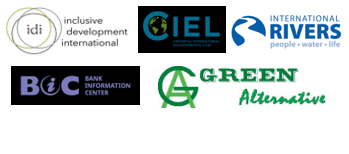JOINT STATEMENT
Every year at its Annual General Meetings, the World Bank hosts a “Civil Society Policy Forum” (CSPF) in order for the Bank to learn from and dialogue with civil society organizations. This year our organizations — the Center for International Environmental Law, Bank Information Center, International Rivers, Inclusive Development International and Green Alternative- proposed a session for the CSPF entitled, “Sustainable Hydropower-Does It Exist?”
However, despite subsequent repeated requests to the relevant World Bank Group officials, the Bank refused to appoint anyone to participate in the session. We have thus decided to withdraw our panel session from the CSPF.
We proposed the session over concerns that the World Bank, and in particular its International Finance Corporation (IFC), continue to promote large-scale hydropower under the guise of “sustainable hydropower” even in the face of massive and mounting evidence of its failure to avoid large-scale social and environmental damage. We were ready to provide evidence of these failures from around the globe. The main objective was to ask the World Bank to consider these findings and provide a clear explanation of its policy and thinking on large-scale hydropower moving forward. In approving the session, the CSPF organizers noted that the proposed session would be “timely and interesting.”
Organizing a policy forum in which you invite civil society dialogue and approve the participation of those with critical perspectives, but then refuse to listen and respond to what your invitees have to say, makes a farce of the whole rationale for this forum.
The refusal of the World Bank to sit down and have a conversation with researchers regarding hydropower continues a disturbing trend. Last year, contributors to the newly published book Dead in the Water, which examines the World Bank’s signature “model” hydropower project in Laos, Nam Theun 2, traveled to the 2018 Annual Meetings in Bali, Indonesia for a session organized by Inclusive Development International and Bank Information Center-Europe. The session had been accepted by the CSPF but the World Bank not only refused to provide a requested respondent for the session panel but also declined to have any of its staff be present in the room to listen to what the presenters had to say.
The World Bank Group’s refusal to publicly discuss their large hydropower strategy at the 2019 Annual Meetings comes just weeks after the IFC faced criticism and boycotts by local civil society and environmental groups in Myanmar over its continuing promotion of planning for new private-sector hydropower projects in that country. Given the World Bank’s years of promotion of Nam Theun 2, and the IFC’s ongoing support for so-called “sustainable” hydropower in Laos and Myanmar, it is puzzling and concerning that these institutions are so unwilling to engage on these issues in their own forum.


